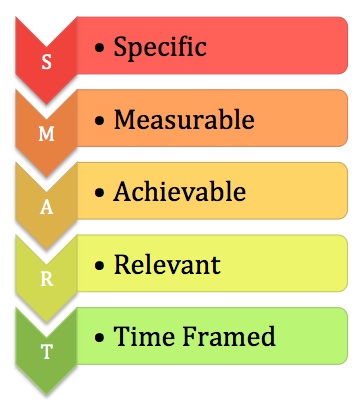Plan your development
From WikiEducator
| Practice Context | |
|---|---|
| Digital Citizenship | |
| Personal learning plan | Objectives | Identify Development Needs | Plan your development | e-Learning activity - Digital literacy skill development | Learning Summary |
Plan your development
Two key questions are invaluable to helping set goals and create a plan for future development.1. What do you want or need to learn?
- Identify your goals - short-term, medium-term and long-term.
2. What actions are needed to reach these goals?
The SMART Action Plan is very useful for framing goals and actions. Five characteristics are incorporated when setting goals.
- Specific - distinct and descriptive wording makes the goals understandable and easier to achieve. Ask yourself - who, what, when, where, which, and why?
- Measurable - embed criteria that will help you measure whether the goals are progressing and being met.
- Achievable - goals need to be attainable so that you can complete them. Ensure the actions needed to meet the goals fit with your schedule and commitments.
- Realistic - goals need to be relevant to your work context, able to be met and will add value to your practice.
- Timely - deadlines will help you to reach your goals so be clear about how you will know when you have reached them (i.e., be clear about the milestones or outputs for each goal).
- Actions - decide on the actions you will need to take to reach your goals
- Use the following prompts to help you work out what you need to do.
- What do you need to learn to reach your goals?
- How do you intend to achieve the learning?
- What activities or tasks will you need to undertake?
- How will you monitor your progress?
- What deadlines will you set for your goals?
- When will you know that you have achieved your goals?
- Resources
- Use the following questions to plan the resources you will need to meet your goals.
- What do you need to enable you to undertake the activities that will help your learning?
- What resources will you need?
- Where will you find them?
- Who can support and encourage your learning?
- How will you make the most of that support?
- What are the barriers (if any) to your learning?
- How will you avoid or overcome those barriers?
- Evidence
- Use the list of questions to decide how to show that you have met your goals.
- How will you know when you have learned enough to meet your goals?
- What can you produce as an output (milestone) of that learning?
- What will demonstrate that you have achieved your goals?
After considering these four areas a plan can then be recorded in whatever format works best for you. Below is an example of a useful table.

